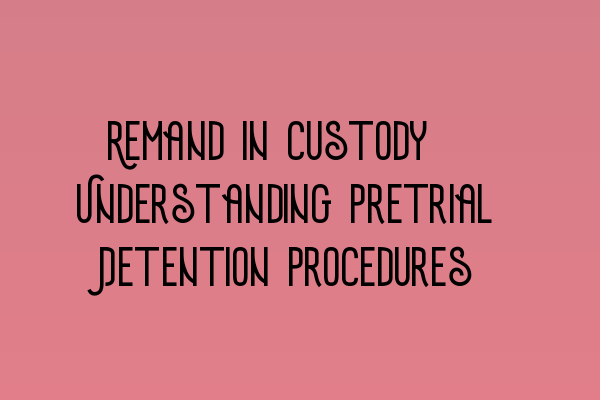Remand in Custody: Understanding Pretrial Detention Procedures
At SQE Criminal Law & Practice Law UK, we understand the importance of comprehending all aspects of the legal system. In this blog post, we will delve into the intricacies of remand in custody and provide you with a detailed understanding of pretrial detention procedures in the UK.
The Basics: What is Remand in Custody?
Remand in custody refers to the situation where an individual is detained in prison while awaiting trial. This typically occurs when the court believes that there is a risk of flight, interference with witnesses, or further commission of offenses if the accused is released on bail.
It is important to note that remand in custody is not a form of punishment. Instead, its purpose is to ensure that the accused attends their trial and does not endanger the judicial process. It is a precautionary measure taken by the court to safeguard the interests of justice and public safety.
Pretrial Detention Procedures
When an individual is arrested, they are brought before a magistrate or lower court judge. The court will then decide whether the accused should be remanded in custody or released on bail.
If the court chooses to remand the accused in custody, several procedural steps are followed:
- First Court Appearance: The accused is brought before the court within 24 hours of their arrest.
- Grounds for Remand: The court will consider the specific circumstances of the case to determine whether there are valid grounds for remand in custody.
- Legal Representation: The accused has the right to legal representation during this process. It is crucial to engage the services of an experienced criminal solicitor to ensure a strong defense.
- Bail Application: If the accused wishes to challenge their remand in custody, they can make a bail application. The court will then assess the merits of the application, taking into account factors such as the seriousness of the offense, the accused’s criminal history, and the likelihood of the accused attending future court proceedings.
- Review Hearings: In cases where the remand in custody continues, review hearings are conducted periodically to reassess the need for detention. It provides an opportunity for the defense to present any new evidence or arguments supporting the release of the accused.
- Trial: Once all pretrial procedures are completed, the case proceeds to trial. The accused remains in custody until the trial is concluded, unless a successful bail application is made.
Expert Legal Advice and Representation
Understanding the complexities of pretrial detention procedures is essential for defendants and their legal representatives. At SQE Criminal Law & Practice Law UK, we offer expert legal advice and representation to navigate the intricacies of the criminal justice system.
Our team of experienced solicitors is well-versed in securing favorable outcomes for our clients. Whether you need assistance with bail applications, review hearings, or representation during trial, we are here to provide you with expert guidance every step of the way.
For more information on related legal topics, we encourage you to read the following articles:
- Legal Representation for Delaware LLCs in the UK: Expert Advice
- Ensuring Ethical Business Practices: Delaware’s Code of Conduct
- Legal Challenges for UK Businesses in the U.S.: Strategies for Overcoming Hurdles
- UK Criminal Law: An In-Depth Analysis of the British Legal System
- Legal Challenges for UK Businesses in the U.S.: Strategies for Overcoming Hurdles
Contact SQE Criminal Law & Practice Law UK today to schedule a consultation with our experienced solicitors. We are here to protect your rights and provide you with the best possible legal representation.
